Figure 5. ROS production by PBMC-derived monocytes and in the J774A.1 cell line (mouse macrophages) is also reduced by pre-incubation with iron-binding molecules.
A) ROS production in PBMC-derived monocytes pre-incubated with yersiniabactin or iron-saturated yersiniabactin. Black bars: PBMCs pre-incubated with 90 µM yersiniabactin and subsequently activated with PMA. Gray bar: PBMCs pre-incubated with 90 µM iron-saturated yersiniabactin and subsequently activated with PMA. White bar: no compounds added. aBar: Negative control: 90 µM yersiniabactin was added but the cells were not stimulated with PMA; **p value = 0.0053, *p value = 0.02. B) Yersiniabactin, aerobactin, deferoxamine, and deferiprone all inhibit ROS production in the J774A.1cell line (mouse macrophages) in a concentration-dependent manner, but yersiniabactin is the most potent in reducing ROS production. Red line: concentration-dependent decrease in ROS production following treatment with yersiniabactin. Blue line: concentration-dependent decrease in ROS production following treatment with iron-saturated yersiniabactin. Gray line: concentration-dependent decrease in ROS production following treatment with aerobactin. Yellow line: concentration-dependent decrease in ROS production following treatment with deferiprone. Green line: concentration-dependent decrease in ROS production following treatment with deferoxamine. The level produced by stimulated PMNs without additives was set as 100%. All experiments were replicated three times, and each sample was analyzed in duplicate.

